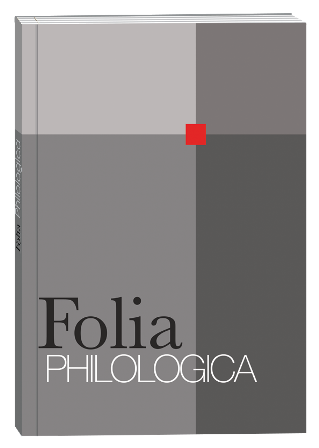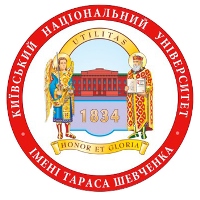COGNITIVE DIMENSION OF WORD-FORMATION SEMANTICS IN INTRANUMERAL WORD FORMATION: EVENT-BASED CONTENT
DOI:
https://doi.org/10.17721/folia.philologica/2022/4/6Keywords:
word-formation meaning, denumerative, word-formation nest, frame, subframe, slot, propositional structure, propositionAbstract
The article proposes to consider the cognitive aspect of the word semantics of derivatives with a mutational type of derivation in the intra-numerical word formation. The analysis is implemented by involving a propositional-semantic frame method that promotes cognitive modeling of derivatives of seven word-forming meanings, taking into account the hierarchy of frame structures (frame→ subframe → slot → three-element propositional scheme → three-component specific proposition). The presence of a significant action as one of the three constituents of the deep level of language, namely its core, is justified. The central predicate is inherent in derivatives with a mutational type of derivation, which are based on an event proposition. The thematic filling of word meanings of cognitive content is established, as well as verbalized slots, by which we understand the motivational seme of each lexical-semantic variant of the non-derived vertex numeral. It has been found that word meanings can be grouped based on mental slots or function based on a common theme. Additionally, their verbal manifestations have been identified. The word semantics of derivatives with a mutational type of derivation can be characterized by semantic increments, which are set within each lexical meaning, as well as increments at the level of propositions, namely left and right-sided actors and the predicate component. For the first time in Ukrainian studies, the emphasis has shifted from the description of frame structures represented by word nests to a word value that is established according to the onomasiological principle (taking into account the distinction of the functional-semantic category of quantity from the word semantics). This approach will facilitate a comprehensive description of word semantics, complementing the achievements of derivatology with cognitive discovery. As a result of this work, the actant components of propositions, represented by quantitative content, have been typologized. This enables the establishment of the cognitive aspect of word-formation semantics in derivatives derived from numerals. The prospects of this research also include data computerization, which will facilitate searching for words based on queries such as “frame”, “cognitive slot”, “verbalized slot”, “propositional scheme”, “proposition”, and “word-forming meaning”.
References
Antologiia kontceptov [Anthology of concepts] (2005). Volgograd: Paradigma. T. 1. 352 s. [in Russian].
Aristotel (1939). Kategorii [Categories]. Moskva. 89 s. [in Russian].
Boldyrev, N.N. (2000). Freimovaia semantika kak metod kognitivnogo analiza iazykovykh edinitc [Frame semantics as a method of cognitive analysis of language units]. S. 1–7 URL: https://www.academia.edu/3625741/Фреймовая_семантика [in Russian].
Borisenkova, L.M. (2009). Kognitivnaia sistema predstavleniia mira (na materiale slovoobrazovaniia nemetckogo iazyka) [Cognitive system of representation of the world (on the material of word formation of the German language)]. Yazikoznanie i literaturovedenie. № 1 (018). S. 62–69 [in Russian].
Vakaliuk, I.V. (2019). Funktsionalno-semantychna katehoriia diieslivnoi kvantytatyvnosti v suchasnii ukrainskii literaturnii movi [Functional-semantic category of verb quantitativity in modern Ukrainian literary language]: dys. … kand. filol. nauk: 10.02.01. Ivano-Frankivsk. 217 s. [in Ukrainian].
Velykyi tlumachnyi slovnyk suchasnoi ukrainskoi movy [Explanatory dictionary of the modern Ukrainian language] (2002) / za red. V.T. Busela. Kyiv; Irpin. 1440 s. [in Ukrainian].
Hreshchuk, B.V. (2012). Slovotvirni katehorii i kohnityvna katehoryzatsiia diisnosti [Word-formation categories and cognitive categorization of reality]. Visnyk Prykarpatskoho natsionalnoho universytetu – Bulletin of the Precarpathian National University. Vyp. 33–39 [in Ukrainian].
Greshchuk, V.V. (2020). Slovotvirne hnizdo z vershynoiu Khrystos u movnii kartyni svitu ukraintsiv [The wordcreating nest with the apex of Christ in the linguistic picture of the world of Ukrainians]. Studia Ucrainica Varsoviensia. № 8. S. 11–21 [in Ukrainian].
Greshchuk, V.V. (1995). Ukrainskyi vidprykmetnykovyi slovotvir [Ukrainian adjective word formation]: monohrafiia. Ivano-Frankivsk: Plai. 208 s. [in Ukrainian].
Evseeva, I.V. (2011). Kompleksnye edinitcy russkogo slovoobrazovaniia: kognitivnyi podkhod [Complex units of the Russian word formation: cognitive approach]: monografiia. Moskva: Knizhnyi dom “Librokom”. 310 s. [in Russian].
Kocherha, H.V. (2012) Istorychna deryvatolohiia ukrainskoi movy v kohnityvnomu vymiri [Historical derivatology of the Ukrainian language in the cognitive dimension]. Slov’ianskyi zbirnyk: zbirnyk naukovyh prats – Slavic collection: collection of sciencific works. Kyiv: Vydavnychyi dim Dmytra Buraho. Vyp. 17. Ch. 2. S. 90–95 [in Ukrainian].
Minskii, M. (1979). Freimy dlia predstavleniia znanii [Frames for presentation is known]. Moskva: Energiia [in Russian].
Narysy z osnovotsentrychnoi deryvatolohii [Essays on fundamental-centric derivatology] (2007): monohrafiia / Greshchuk V.V., Bachkur R.O., Dzhochka I.F., Poslavska N.M.; za red. V. Greshchuka. Ivano-Frankivsk: Misto NV. 348 s. [in Ukrainian].
Osadchii, M.A. (2007). Propozitcionalno-freimovoe modelirovanie gnezda odnokorennykh slov: na materiale russkikh narodnykh govorov [Positional-frame modeling of the nest of single-root words: on the material of Russian folk dialects]: avtoref. diss. … kand. filol. nauk: 10.02.01. Kemerovo. 27 s. [in Russian].
Pavlenko, V.G. (2015). Propozitcionalno-freimovaia organizatciia gnezd odnokorennykh slov mentalnogo znacheniia v angliiskom iazyke [Propositional-frame modeling of a nest of single root words in English language]. Iazyk i kultura – Language and culture. № 4 (32). S. 65–72 [in Russian].
Poliuzhyn, M.M. (1999). Funktsionalnyi i kohnityvnyi aspekty anhliiskoho slovotvorennia [Functional and cognitive aspect of English word formation]. Uzhhorod: Vydavnytstvo “Zakarpattia”. 235 s. [in Ukrainian].
Ponomareva, E.A. (2017). Freimovoe modelirovanie leksiko-slovoobrazovatelnykh gnezd s vershinami – imenami somaticheskikh obektov (na materiale russkogo iazyka) [Frame modeling of lexical and word-forming nests with vertices – names of somatic objects (on the material of Russian language)]: avtoref. diss. … kand. filol. nauk: 10.02.01. Krasnoiarsk [in Russian].
Slovnyk ukrainskoi movy [Dictionary of the Ukrainian language] (1970–1980): v 11 t. / za red. I.K. Bilodida. Kyiv [in Ukrainian].
Slovnyk ukrainskoi movy [Dictionary of the Ukrainian language] (2010–2019): v 20 t. / za red. V.M. Rusanivskoho. Kyiv. T. 1–11 [in Ukrainian].
Falomkina, I.P. (2012). Propozitcionalno-freimovoe modelirovanie slovoobrazovatelnoi nishi s formantom -n/ia/(na materiale russkikh narodnykh govorov) [Positional-frame modeling of word-forming niche with formant -n/i/ (on the material of Russian folk dialects)]: avtoref. … kand. filol. nauk: 10.02.01. Kemerovo [in Russian].
Shyshlina, O.A. (2011). Poniattia slovotvirnoho kontsepta [The concept of a word-formation concept]. Filolohichni nauky: zbirnyk naukovyh prats – Philological Sciences: collection of scientific works. Poltava. № 8. S. 110–115 [in Ukrainian].
Shmeleva, T.V. (1988). Semanticheskii sintaksis [Semantic syntax]: tekst lektcii. Krasnoiarsk. 54 s. [in Russian].
Iantcenetckaia, M.N. (2014). Propozitcionalnyi aspekt slovoobrazovaniia (obzor sibirskikh derivatologov) [Positional aspect of word formation (overview of siberian derivatologists)]. Vestnik Tomskogo gosudarstvennogo universiteta – Vestnik of Tomsk State University. № 1 (27). S. 167–192 [in Russian].









